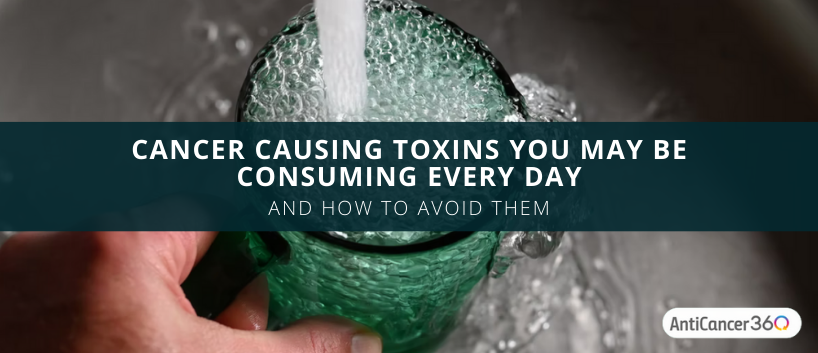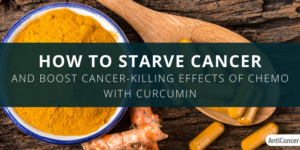Cancer is one of the leading causes of death in the United States today. One of the most important questions of our day is, “what causes cancer?” The better we understand the answer to this question, the better we are able to stop cancer from forming and to stop it in its tracks.
If you or a loved one is struggling with cancer or would like to prevent it from ever developing, this article is a must read. By the end, you will better understand toxins that contribute to the development of cancer, where they are found, and more importantly, how they can be avoided.
What Causes Cancer?
The simple answer is, “many things cause cancer.” Cancer cells ultimately develop due to a breakdown of their ability to properly function and regulate themselves, while simultaneously evading the part of the immune system that is meant to identify cancerous cells and eliminate them. Things like genetic mutations, altered cellular metabolism, inflammation, and altered immune function are the common hallmarks of cancer [1].
Cancer Related Changes are Often Caused by Environmental Toxins
Ultimately, there are many causes of the changes that lead to cancer. Things such as diet, lifestyle, environmental exposures, microbial infections, and genetics are all causative factors [2]. Unfortunately, there is little we can do about genetics, however, there is a lot we can do about these other causes.
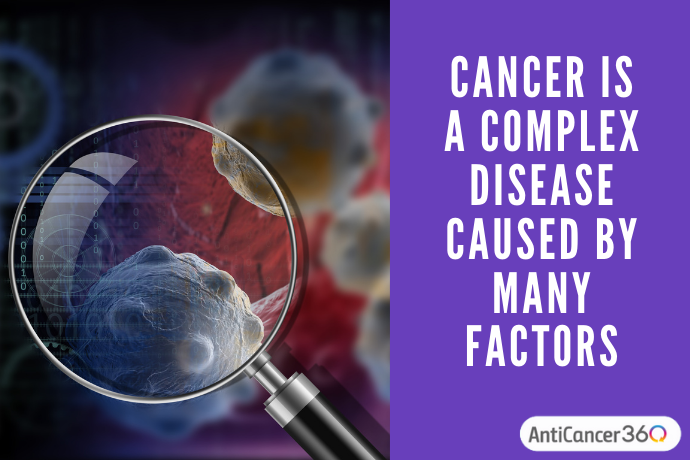
It all starts with knowing what in our environment can contribute to cancer and where we are getting exposed to those chemicals. Only then can we diligently avoid them as much as possible. A full list of cancer causing chemicals can be found in the Fifteenth Report on Carcinogens from the National Institute of Health [3]. Wow, that is quite the list!
So, where do we get exposed to these chemicals? One of the most common sources of carcinogens (cancer causing chemicals), is good ol’ tap water.
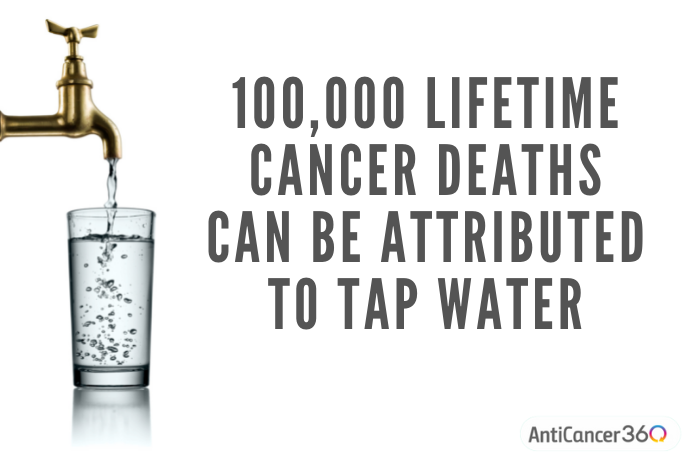
In fact, one research paper concluded that as many as 100,000 lifetime cancer deaths can be attributed to carcinogens found in drinking water [4]! Twenty two carcinogens have been identified, including:
- Arsenic
- hexavalent chromium
- disinfection byproducts (from adding chemicals to kill bacteria and parasites)
- radioactive elements (like uranium and radium)
- volatile organic compounds (like benzene)
- and more…
The Environmental Protection Agency (EPA) Does Not Do Enough to Regulate Carcinogens in Drinking Water. The EWG to the Rescue!
Unfortunately, the EPA does not do a thorough enough job monitoring and protecting drinking water sources. They have set standards for a number of chemicals, such as lead, however, there are many more cancer causing chemicals found in municipal water supplies all over the country.
One of my favorite watchdog groups for environmental toxins is called The Environmental Working Group. They recently came out with their 2021 Tap Water Database. They have compiled this database using the mandatory testing done by utility companies all over the country to help empower everyday citizens with the knowledge of exactly what they are drinking. You can access this database here to see exactly what is in your tap water.
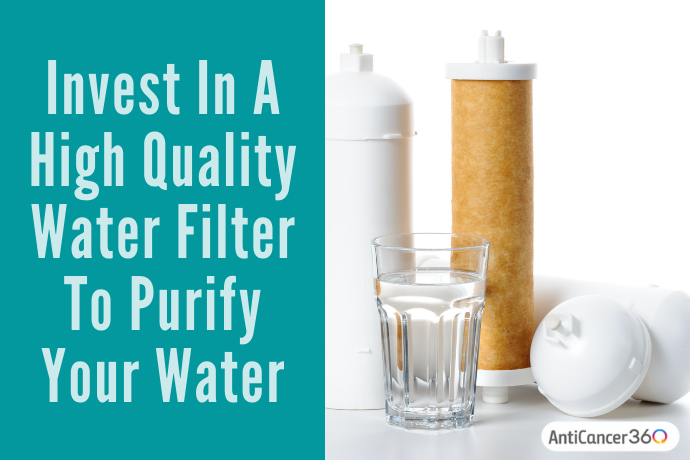
Simply type in your zip code and select where your water is coming from. You will then get a list of all of the contaminants that were found and which ones are found above the level known to cause health effects. Each one will then include its potential effect. What you will notice is that most of them have the potential to cause cancer. You will also see that many of these chemicals have no legal limit. In other words, the EPA is not protecting you from these chemicals. Protecting yourself from these chemicals is entirely up to you.
Protecting Yourself and Your Loved Ones is as Simple as Investing in High Quality Water Filtration Systems.
Luckily, the solution to this problem is quite simple. Always filter your tap water. There are a lot of ways to do this and a lot of water filters on the market, so understanding your options and what is needed to fully protect yourself is essential.
Luckily, the EWG comes to the rescue again. On that same report of your drinking water, if you continue to scroll down, you will find a chart of the contaminants and what types of water filters will eliminate them. You will notice that most of these chemicals can be removed with a simple carbon based filter. They even have a guide on water filters and a link to reach out to governing officials that are responsible for regulating tap water.
Finding the Best Water Filtration System on the Market for the Most Reasonable Cost Takes a Little Research
Hands down, the systems that remove the most contaminants from water are reverse osmosis. These systems can be installed on an entire house or smaller counter top or under sink models can be purchased for filtering drinking/cooking water.
Do note, however, that the process of reverse osmosis strips out everything, including beneficial minerals. There are some concerns over the ill effects that can happen from drinking reverse osmosis water [5], including absorbing more heavy metals from food (some of which are linked to cancer!) So, one must make sure to also purchase ionic minerals that can be added back to the water, making it safe again to drink.
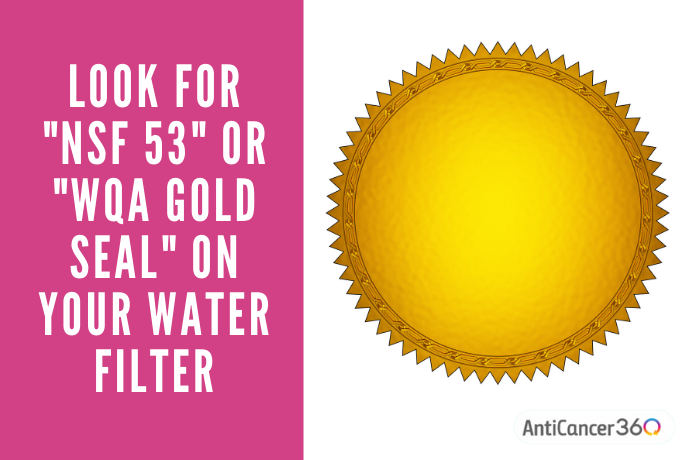
Because there are constantly new filters being produced and entering the market, it is more prudent to give you the tools for determining which systems are the best.
The two fundamental certifications you want to look for are the “NSF Standard 53” (National Sanitation Foundation International – search tool) and “WQA Gold Seal” (The Water Quality Association – search tool). You can use the two previous links to check any filtration system you are considering buying to make sure these organizations certify them.
To make things simpler, consider using a company that is reviewing water filters and telling you about the best ones on the market. Cleaner Softer Water is one such excellent website.
Just Filtering Drinking Water is Not Enough. Also Consider Showers, Baths, Laundry, etc.
Unfortunately, we can’t stop with only filtering the water we drink and cook with. We also get exposed to tap water chemicals when we shower, bathe, wash hands, etc. For this reason, it makes sense to also install a whole house filter; if that is an option for you (they can be an expensive option).
A whole house filter makes it simple to avoid the majority of cancer linked chemicals from the tap. If you are unable to install a whole house filter then installing a shower filter would be the next priority, as many of the toxins become gases that are inhaled during a hot shower or bath. (Remember to draw a bath using the shower head instead of the normal faucet in this scenario!)
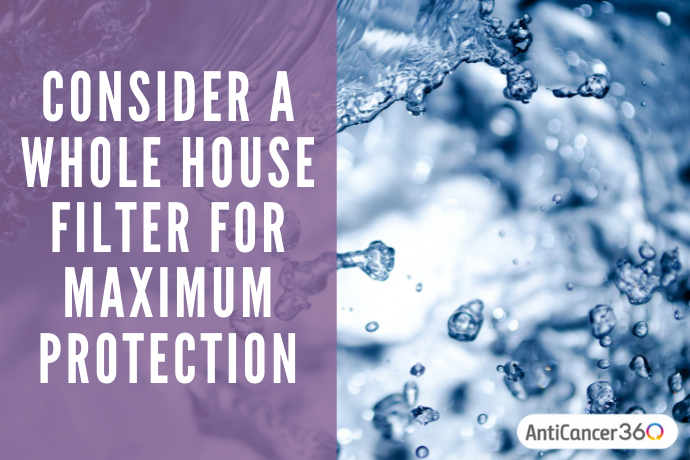
Ultimately, the more exposures that are eliminated the less damage done over time, and the lower the cancer risk. Think of it like smoking cigarettes (which we know causes cancer). It’s the constant exposure to toxins from the cigarettes over many decades that damage cells and lead to cancer. Stop smoking and the related cancer risk drops substantially.
Similarly, minimize your exposure to these cancer causing toxins in your tap water and you can drop your cancer risk considerably.
Well Water May Not Be Safe Either
The answer to that is, it depends. As you are not getting things like haloacetic acids and chloroform, which are byproducts of water sanitation methods in municipal water sources, you likely have lower exposure to certain toxins.
However, well water brings a host of other possible exposures, such as arsenic and nitrates (from fertilizer run-off) that could be seeping into your underground water table. Therefore, it is still prudent to filter well water.
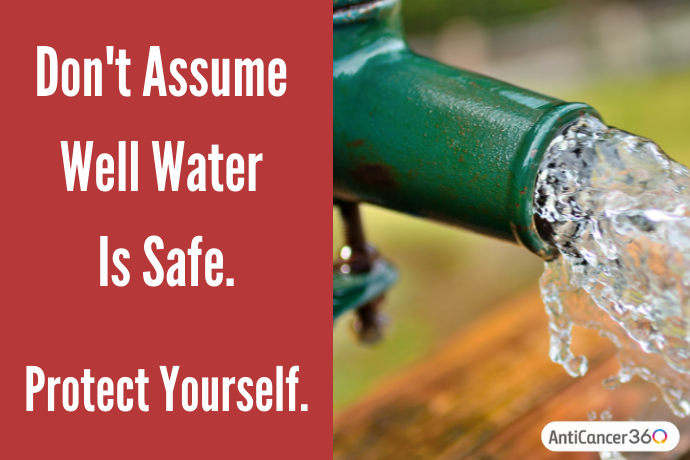
Another option is to have your well tested for these contaminants; however, I have yet to find a company that offers a comprehensive test for all known carcinogens. Furthermore, just because a well tests clean one day may not mean it remains clean in the coming months or years, so regular testing will be needed. It may be much simpler to just get a high quality water filter for well water as well.
Restaurants and Facilities Are Likely Not Filtering Their Water, So Bring Your Own.
When we go out for coffee, beers, or dinner with a glass of water or soft drink, realize that these products are all often made with tap water. For this reason, I prefer to take my own water with me. It is really inexpensive to invest in a BPA and phthalate free (ideally glass) water bottle (see below for more on this). This way you can have clean, carcinogen free water wherever you go.
Buying Bottled Water May Not Be A Good Solution
Bottled waters that come in plastic carry their own cancer risk. There are primarily 2 major toxins that are introduced to water from the plastic they are stored in: Bisphenol A (BPA) and Phthalates.
BPA is most problematic in contributing to breast and prostate cancers, the most common cancers in women and men respectively [6]. Phthalates have been linked to breast cancer in particular [7]. The plastics with the most phthalate contain the recycle code 3, so at the minimum, look for this symbol and avoid those specific plastics.
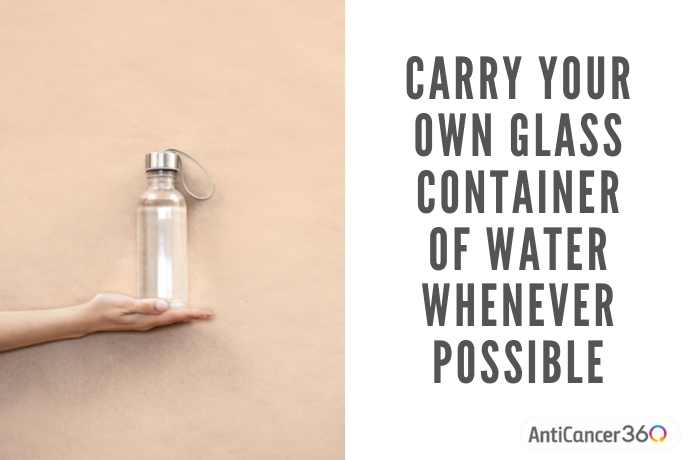
Purchasing spring waters that are kept in glass is the safest method for obtaining water outside the home, as they are not kept in plastic, the sources are tested for many contaminants, and no carcinogens have been introduced through water purification chemicals (as in tap water).
Conclusion
We live in a toxic world where our bodies are inundated by harmful chemicals. Many of these chemicals are linked to cancer.
One of the easiest ways to reduce our exposures to these chemicals is by understanding our exposure to these chemicals in our water sources. As you can see, it is rather simple to filter out and avoid many of these cancer causing substances, with a little due diligence.
Lastly, this article focused on carcinogens in drinking water, but there are many other toxins in water sources that impact other aspects of health, like heart disease, brain health, diabetes risk, and has implications for pregnancy [8],[9]. All in all, it’s a great idea to start filtering your water today.
Derrick Schull is a naturopathic doctor with a decade of experience helping others integrate the best natural and alternative interventions to meet their health goals. He has extensive experience in anticancer strategies, gut health, and brain health. As part of the AntiCancer360 team, Dr. Derrick coordinates your case-specific research, lab tests, oncology treatment info, and supplement-drug interactions to design a comprehensive program that’s tailored to your particular case.

